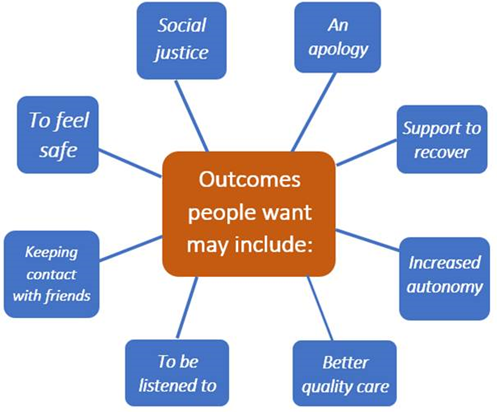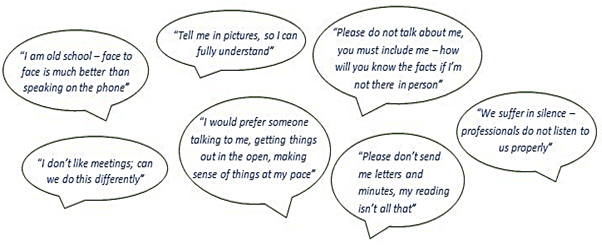Making Safeguarding Personal

"Safeguarding may be everyone's business but making safeguarding personal means it is my business". (Source CLASP Wokingham)[1]
Our safeguarding policy and procedures provide a firm foundation for making safeguarding personal in Jersey. Making Safeguarding Personal (MSP) is a UK approach to promote responses to safeguarding situations in a way that enhances a person's involvement, choice and control as well as improving quality of life, well-being and safety. It is about seeing people as experts in their own lives and working alongside them to identify the outcomes they want, with the aim of enabling them to resolve their circumstances and support their recovery.
MSP means that safeguarding:

The key focus is on developing a real understanding of what people wish to achieve. This includes agreeing, negotiating and recording their desired outcomes, working out with them (and their representatives or advocates if they lack capacity) how best those outcomes might be reached, and the extent to which desired outcomes have been realised.
Below are two video links about MSP that offer a good outline and description of what MSP is and its importance throughout the journey of people at risk:
- CLASP Wokingham (UK) - Making Safeguarding Personal Educational Video;
- Making Safeguarding Personal Educational Video from Waltham Forest Council.
Below is a graphic highlighting SOME possible outcomes people may define: (this is not an exhaustive list):

As part of the co-production of this Adult Safeguarding Policy, a meeting took place with a reference group in Jersey to give them the opportunity to talk about adult safeguarding and understand what they would like to see happen should they ever be in need of a safeguarding intervention. Below are some examples of what was suggested by the group;

The MSP culture shift underpinning these multiagency policy & procedures is based around holding (a series of) conversations with people, about their wishes, the risks, their involvement and how agencies can work together towards achieving their desired outcomes wherever possible.
MSP must not simply be seen in the context of a formalised safeguarding enquiry – but in the whole spectrum of safeguarding activity including prevention and early intervention. |
MSP does not mean 'walking away' if a person declines safeguarding support, or an enquiry. That is not the end of the matter. Empowerment must be balanced with a general duty of care, and principles set out in the Human Rights (Jersey Law) 2000 and Capacity & Self Determination (Jersey) Law (2016). Best practice in working with risk must be followed.
1. MSP - A Conversational Approach
Effective safeguarding practice involves having conversations that:
|
The full participation of people in all decisions affecting their lives should be encouraged. It is important to talk to the person about what support they want and what they hope can be achieved, with an understanding of the person's desired outcomes (the changes the person wants to achieve).
Where people have unrealistic expectations or expectations that may be difficult to attain, it is important this is discussed from the beginning to avoid a person having false expectations of what can be achieved. An early discussion will also enable the person to consider if there are other avenues they wish to consider in relation to their concern.
Where other people are also at risk however, the safety of everyone concerned will need to be fully considered. This means that sometimes the need to protect others may have to take precedence over one person's desired outcomes. Where this happens, the reasons for these actions should be explained wherever possible.
The person's views and beliefs are critical to a personalised way of working with them. Additionally, the person should be the primary focus of decision-making, determining what safeguards they want in place. Conversations are an opportunity to provide information, advice and support in a form that the person can understand, explore options and help the person retain choice & control.
The conversational approach needs to take place from the beginning to the conclusion of any safeguarding involvement. This is to make sure the person is fully involved and to ensure that any changes to their desired outcomes are communicated and heard. The conversational approach is about listening – and working alongside people at their pace.
Conversations provide opportunities to tailor a bespoke safeguarding intervention – to test out, check out and agree what is right for the person, with the person – based on the principle of no decision about me; without me.
2. Safeguarding, Personalisation and Risk
The MSP approach involves asking people's views on whether risk has reduced without compromising the other things that are important to them.
Personalisation and safeguarding can be made to work hand in hand. |
There needs to be a proportionate approach to risk, rather than a process which is detached from the individual concerned.
Our multiagency adult safeguarding procedures provide a framework within which a wide range of responses can be made according to the nature of the concerns, the risks, and the person's individual needs.
Safeguarding is fundamentally managing risk about the safety and well-being of an adult in line with the six principles of safeguarding. |
The aim of risk management is:
- To promote, and thereby support, inclusive decision making as a collaborative and empowering process, which takes full account of the individual's perspective and views of relevant others (where appropriate);
- To enable and support the positive management of risks where this is fully endorsed by the multiagency partners as having positive outcomes;
- To promote the adoption by all staff of 'defensible decisions' rather than 'defensive actions'.
Risk assessments and risk management should take a holistic approach and partners should ensure that they have the systems in place that enable early identification and assessment of risk through timely information sharing and targeted multiagency intervention.
Working with risk is a fundamental aspect of health and social care – and exists outside of more formalised safeguarding arrangements. Multiagency working should take place routinely via Multi-disciplinary Team approaches – MDTs. |
Please see 'A framework for understanding and responding to risk' under the Practice Guidance section for further information.
3. Challenges and Dilemmas of MSP
Safeguarding work generally – and MSP approaches specifically – can pose dilemmas and challenges, particularly when a person refuses to engage or refuses an intervention. These issues can be compounded when the person appears to have capacity, or when there is potential for duress, or family members imposing their own agenda on the person (for example), and in situations involving self-neglect.
The MSP shift in culture permits us to look at the whole person, at improving their quality of life - as opposed to focusing on the abuse or risk as something separate that needs to be dealt with. |
Empowering, engaging, informing and developing resilience are all factors that may help counter these challenges and dilemmas. Balancing choice, control, independence and wellbeing calls for sensitive and carefully considered decision-making, and making creative use of multiagency arrangements. |
Our Policy and Procedures recognise the tensions in trying to get the balance right between autonomy, self-determination and protection.
There are no simple answers to these challenges, however, efforts should be made to build and maintain supportive relationships through which in-roads can in time be negotiated.
Refusals of adults at risk (also cited in our procedures) The undertaking of an Enquiry is not dependent on the consent of the adult once it has been established that they are at risk of abuse. There is a duty of care to undertake an assessment of the adult's care and support needs despite their refusal in cases (a) where they lack capacity to refuse the assessment and it would be in their best interests, or (b) where the adult is experiencing, or at risk of abuse or neglect. In cases where the adult does not co-operate with an enquiry or rejects any proposed safeguarding measures there will need to be an attempt to negotiate and seek to identify areas of possible agreement. |
MSP Summary in Quotes (BASW Evaluation Report)
|
For further case study reading, please see the Practice Guidance section.

